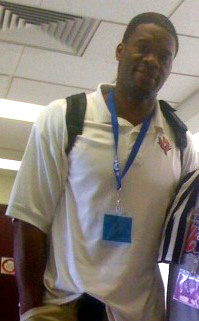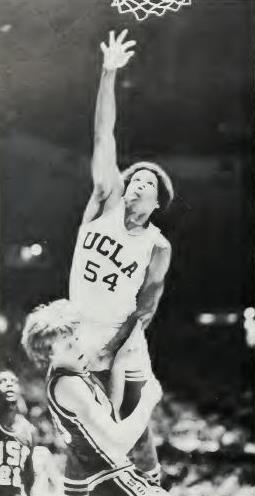
Glenn Alan Robinson Jr. is an American former professional basketball player. Nicknamed "Big Dog" and "the Chosen One", he played in the National Basketball Association (NBA) from 1994 to 2005 for the Milwaukee Bucks, Atlanta Hawks, Philadelphia 76ers, and San Antonio Spurs. Robinson attended Purdue University and was the first overall pick in the 1994 NBA draft. He is the father of Glenn Robinson III, who played college basketball at the University of Michigan and has also played in the NBA.

Moses Eugene Malone Sr. was an American professional basketball player who played in both the American Basketball Association (ABA) and the National Basketball Association (NBA) from 1974 through 1995. A center, he was named the NBA Most Valuable Player (MVP) three times, was a 12-time NBA All-Star and an eight-time All-NBA Team selection. Malone led the Philadelphia 76ers to an NBA championship in 1983, winning both the league and Finals MVP. He was inducted into the Naismith Memorial Basketball Hall of Fame in his first year of eligibility in 2001. Widely regarded as one of the greatest players in the sport's history, Malone is also seen as one of the most underrated NBA players.

Antonio Lee Davis is an American former professional basketball player who played for the Indiana Pacers, Toronto Raptors, Chicago Bulls, and New York Knicks of the National Basketball Association (NBA). He also played for Panathinaikos B.C. in Greece and Philips Milano in Italy. Davis is also the former president of the National Basketball Players Association (NBPA). On October 31, 2012, ESPN announced the hiring of Davis as a studio analyst for NBA broadcasts. He is also currently a co-host/analyst on SiriusXM NBA Radio.

David William Cowens is an American former professional basketball player and NBA head coach. At 6 ft 9 in (2.06 m), he played the center position and occasionally played power forward. Cowens spent most of his playing career with the Boston Celtics. He was the 1971 NBA Rookie of the Year and the 1973 NBA Most Valuable Player. Cowens won NBA championships as a member of the Celtics in 1974 and 1976. He was inducted into the Naismith Memorial Basketball Hall of Fame in 1991. Cowens has also held coaching positions in the NBA, CBA, and WNBA.

Kurt Vincent Thomas is an American former professional basketball player. A 6'9", 230 lb. power forward-center, Thomas was known for his hard-nosed playing style and tough defense during his eight year tenure with the New York Knicks. Having played college basketball at Texas Christian University, he was drafted by the Miami Heat in 1995 and went on to play parts of 18 seasons in the NBA.
Richard Charles Pierce is an American retired National Basketball Association (NBA) player. Nicknamed "Deuces" and "Big Paper Daddy", he was selected as an NBA All-Star (1991) and was twice the NBA Sixth Man of the Year while with the Milwaukee Bucks.

Marques Kevin Johnson is an American former professional basketball player and character actor who is a basketball analyst for the Milwaukee Bucks on Bally Sports Wisconsin. He played as a small forward in the National Basketball Association (NBA) from 1977 to 1989, where he was a five-time All-Star. He played the majority of his career with the Bucks.

Steven Charles Mix, nicknamed "The Mayor", is an American former professional basketball player and coach. Mix had a thirteen year playing career, was an NBA All-Star and played in the NBA Finals on four occasions. He later had a lengthy career as a broadcaster for the Philadelphia 76ers.

Sidney Alvin Moncrief is an American former professional basketball player. As an NCAA college basketball player from 1975 to 1979, Moncrief played for the University of Arkansas Razorbacks, leading them to the 1978 Final Four and a win in the NCAA Consolation Game versus #6 Notre Dame. Nicknamed Sid the Squid, Sir Sid, and El Sid, Moncrief went on to play 11 seasons in the National Basketball Association, including ten seasons with the Milwaukee Bucks. He was a five-time NBA All-Star and won the first two NBA Defensive Player of the Year awards in 1983 and 1984. He was elected to the Naismith Memorial Basketball Hall of Fame in 2019.
The 1982–83 NBA season was the 37th season of the National Basketball Association. The season ended with the Philadelphia 76ers winning the NBA Championship, sweeping the Los Angeles Lakers 4 games to 0 in the NBA Finals.
Clifford Trent Robinson is an American former professional basketball player.

Paul Matthew Pressey is an American former professional basketball player who was also an assistant coach for seven different National Basketball Association (NBA) teams. Pressey is widely credited as being one of the initial point forwards, combining the attributes of a point guard and forward.
Francis Anthony Brickowski is an American former professional basketball player, formerly in the National Basketball Association (NBA).
Kurt Nimphius is an American former National Basketball Association (NBA) player. Nimphius played nine seasons in the NBA after his collegiate career at Arizona State University.
The 1989–90 NBA season was the Spurs' 14th season in the National Basketball Association, and 23rd season as a franchise. This marked the first NBA season for David Robinson, who was selected by the Spurs as the first overall pick in the 1987 NBA draft. In the 1989 NBA draft, the team had the third overall pick, and selected Sean Elliott from the University of Arizona, and acquired All-Star forward Terry Cummings from the Milwaukee Bucks, and acquired All-Star guard Maurice Cheeks and David Wingate from the Philadelphia 76ers during the off-season. The Spurs held a 32–14 record at the All-Star break, finished with a franchise-best 56–26 regular season record, first place in the Midwest Division, and surpassing the 53-win season of 1982–83.

Timothy Mark Thomas is an American basketball coach and former professional player. He was a highly ranked prospect while playing at Paterson Catholic High School in his hometown of Paterson, New Jersey. Thomas played college basketball for the Villanova Wildcats and declared for the 1997 NBA draft after his freshman season. He spent thirteen seasons in the National Basketball Association (NBA) for the Philadelphia 76ers, Milwaukee Bucks, New York Knicks, Chicago Bulls, Phoenix Suns, Los Angeles Clippers and Dallas Mavericks. Thomas serves as the head coach of the boys basketball team at Paramus Catholic High School in Paramus, New Jersey.
The 1988–89 NBA season was the Bucks' 21st season in the NBA. It was the first season for the Bucks playing in the Bradley Center, after the team moved there from the Milwaukee Arena, otherwise known as "The Mecca". During the off-season, the team acquired Fred Roberts from the expansion Miami Heat. The Bucks struggled with a 3–4 start to the season, but later on posted a six-game winning streak in January, and held a 30–15 record at the All-Star break. The team finished fourth in the Central Division with a 49–33 record.
The 1989–90 NBA season was the Bucks' 22nd season in the National Basketball Association. For the first time since the 1978–79 season, Sidney Moncrief was not on the team's opening day roster. During the off-season, the Bucks acquired All-Star guard Alvin Robertson and Greg Anderson from the San Antonio Spurs. Early into the season, the Bucks defeated the Seattle SuperSonics in a quintuple-overtime game on November 9, 155–154 at the Bradley Center. The team held a 27–22 record at the All-Star break. At midseason, the team traded Randy Breuer to the expansion Minnesota Timberwolves in exchange for Brad Lohaus. The Bucks finished third in the Central Division with a 44–38 record.
The 1988–89 NBA season was the Spurs' 13th season in the NBA and 22nd season as a franchise. The Spurs had the tenth overall pick in the 1988 NBA draft, and selected Willie Anderson from the University of Georgia. The team also acquired rookie guard Vernon Maxwell out of the University of Florida from the Denver Nuggets, and hired Larry Brown as their new head coach. The Spurs struggled all season long, posting an 8-game losing streak in December, a 7-game losing streak in January, holding a 13–33 record at the All-Star break, then posting a 13-game losing streak between February and March, and a 9-game losing streak to end their season, finishing fifth in the Midwest Division with an awful 21–61 record, missing the playoffs.

Donte DiVincenzo is an American professional basketball player for the Minnesota Timberwolves of the National Basketball Association (NBA). He played college basketball for the Villanova Wildcats, where he won national championships in 2016 and 2018, being named Final Four Most Outstanding Player (MOP) in 2018. Selected with the 17th overall pick by the Milwaukee Bucks in the 2018 NBA draft, DiVincenzo won his first championship with the Bucks in 2021, before being traded to the Sacramento Kings the following season. He has since played for the Golden State Warriors and New York Knicks, and holds the Knicks franchise records for single-game and single-season three-point shots made. He also holds the NBA record for most three point shots made in a playoff game 7 (9).








